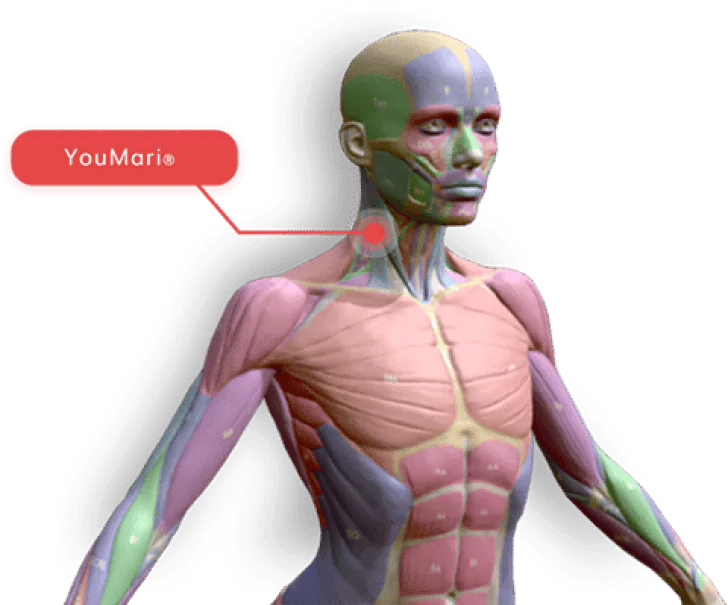Discover personalized, non-invasive therapies that address the root causes of depression and anxiety, improving mental health and quality of life—delivered in our clinics, at home, or onsite at your workplace.
Depression and anxiety are two of the most common mental health conditions, often overlapping and significantly impacting daily life.
These conditions are often linked to imbalances in brain chemistry, inflammation, hormonal dysregulation, and environmental stressors. Without proper care, they can negatively affect emotional health, physical well-being, and overall quality of life.


Managing depression and anxiety requires addressing the root causes rather than just masking symptoms. We use advanced regenerative therapies and a personalized approach to support mental health and emotional well-being. Our treatments focus on reducing inflammation, improving brain function, and balancing hormones, empowering you to regain control of your life.
We combine innovative technologies like photobiomodulation (PBM) and hydrogen inhalation (H2) with personalized care plans to promote healing at a cellular level for sustainable, long-term results.

Experience hands-on care and advanced regenerative therapies in a relaxing, state-of-the-art environment.
Continue your healing journey with easy-to-use devices designed for at-home therapy.
Bring regenerative medicine to your workplace, improving employee health and productivity.
Our Regenerative Therapies our Not the Alternative, they are the
BEST CHOICE
We are committed to personalizing treatment plans based on what is best for every individual’s UNIQUE circumstances to include symptoms, budget, lifestyle, and goals. Conservative (non-pharmaceutical) care is often effective in resolving the symptoms of depression and anxiety.

We will review your health history, symptoms, and current treatments to help determine the severity of your condition. We may recommend additional testing and analysis to get a full picture of potential therapies personalized to you.
If your condition qualifies for conservative care options, we will present a treatment plan that includes only those therapies proven to be effective in treating your condition. This may include red light therapy, hormone balancing, nootropics, testing for common brain-based viruses, addressing inflammation and other therapies to resolve issues that might be limiting mobility and ability to be active. You will be provided with treatment plan options and timelines with transparent out of pocket costs to you.

These are emerging treatments for various conditions, including depression and anxiety. Here’s how they work:
It can play a major role in managing anxiety and depression, particularly when hormonal imbalances are a contributing factor. Here’s an overview:
For Women: Bioidentical Hormone Replacement Therapy (BHRT) can help manage mood swings and depression, especially during menopause or perimenopause. Estrogen has mood-stabilizing effects and can influence neurotransmitter activity.
For Men and Women: Low testosterone levels can be linked to depression and mood disturbances. Testosterone replacement therapy may improve mood and alleviate depressive symptoms especially energy levels and the ability to focus.
Thyroid Imbalances: Hypothyroidism (low thyroid hormone) can contribute to depression. Proper thyroid hormone replacement can help stabilize mood and improve depressive symptoms.
Cortisol: Imbalances in cortisol, the stress hormone, can affect mood. Adrenal hormone therapy or stress management techniques can sometimes help in managing anxiety.
Dehydroepiandrosterone (DHEA): This hormone can affect mood and energy levels. Supplementation may be considered in cases of deficiency.
Overall, hormone therapy may be beneficial for some individuals with anxiety and depression, particularly when hormonal imbalances are a key factor. It should be considered as part of a comprehensive treatment plan.
Nutrigenomics examines how genetic variations affect individual responses to nutrients, allowing for personalized nutritional interventions that may support mental health.
Nutrigenomics can guide personalized dietary recommendations based on genetic profiles to improve mood and reduce symptoms of depression and anxiety.
Pharmacogenomics studies how genetic differences influence individual responses to medications, enabling personalized treatment plans for depression and anxiety.
It helps tailor antidepressant and anxiolytic medications to individual genetic profiles, improving efficacy and reducing side effects.
Sleep Studies focus on improving sleep quality, which is crucial for mental health and can significantly impact depression and anxiety levels.
Improving sleep quality can enhance mood, reduce anxiety, and support overall mental health.
Inflammation Programs focus on reducing systemic inflammation through diet, supplements, and lifestyle changes, which can help alleviate symptoms of depression and anxiety.
Reducing chronic inflammation through targeted interventions can improve mood and reduce symptoms of depression and anxiety.
Red Light Therapy (or Low-Level Laser Therapy) uses specific wavelengths of light to reduce inflammation and support cellular function, which may benefit mental health.
Red light therapy may improve cellular function and reduce inflammation, potentially benefiting mood regulation and mental health.
Bioidentical Hormone Therapy involves using hormones identical to those naturally produced by the body to address hormonal imbalances that can affect mood.
Balancing hormones with bioidentical therapy can improve mood stability and potentially alleviate symptoms of depression and anxiety.
For Women: Bioidentical Hormone Replacement Therapy (BHRT) can help manage mood swings and depression, especially during menopause or perimenopause. Estrogen has mood-stabilizing effects and can influence neurotransmitter activity.
For Men and Women: Low testosterone levels can be linked to depression and mood disturbances. Testosterone replacement therapy may improve mood and alleviate depressive symptoms, especially energy levels and the ability to focus.
Thyroid Imbalances: Hypothyroidism (low thyroid hormone) can contribute to depression. Proper thyroid hormone replacement can help stabilize mood and improve depressive symptoms.
Cortisol: Imbalances in cortisol, the stress hormone, can affect mood. Adrenal hormone therapy or stress management techniques can sometimes help in managing anxiety.
Dehydroepiandrosterone (DHEA): This hormone can affect mood and energy levels. Supplementation may be considered in cases of deficiency.
Overall, hormone therapy may be beneficial for some individuals with anxiety and depression, particularly when hormonal imbalances are a key factor. It should be considered as part of a comprehensive treatment plan.
Environmental Toxins Tests assess exposure to environmental toxins, which can impact mental health.
Reducing exposure to environmental toxins may alleviate symptoms of depression and anxiety by minimizing their impact on overall health.
Shockwave Therapy (Extracorporeal Shock Wave Therapy) primarily targets musculoskeletal conditions but has shown potential in reducing inflammation and supporting mental health.
While primarily used for physical conditions, ESWT may help reduce inflammation and improve overall well-being, potentially supporting mental health.
For managing depression and anxiety, these integrative and regenerative therapies offer diverse benefits:
Persistent sadness, loss of interest in activities, changes in appetite or weight, fatigue, difficulty concentrating, and thoughts of death or suicide.
Excessive worry, restlessness, muscle tension, fatigue, difficulty sleeping, and physical symptoms like heart palpitations and sweating.
Causes include genetic predisposition, brain chemistry imbalances, traumatic experiences, chronic stress, and medical conditions.
Therapy (e.g., cognitive-behavioral therapy), lifestyle changes (exercise, healthy diet), stress management techniques, and support groups can be effective.
If symptoms are severe, persistent, or interfere with daily life, or if you have thoughts of self-harm or suicide. We have trusted partners that we work with and can refer you to someone we will coordinate your care with to assure you get the best physical and mental healthcare possible.
Yes, many treatments address both conditions, especially through therapy and lifestyle changes.
Duration varies; some people see improvement in weeks, while others may need months of therapy or treatment.
Medications can help balance brain chemicals but are often used in conjunction with therapy and lifestyle changes.
Nutrigenomics studies how genetic variations affect individual responses to nutrients and how this can be used to tailor dietary recommendations for better mental health.
Nutrigenomics enables personalized dietary interventions based on genetic profiles, potentially improving mood and reducing symptoms of depression and anxiety.
Pharmacogenomics examines how genetic differences impact individual responses to medications, allowing for more effective and personalized treatment plans.
Pharmacogenomics helps in selecting the most effective medications with fewer side effects by considering individual genetic profiles.
Sleep Studies focus on diagnosing and improving sleep disorders, which are closely linked to mood regulation and mental health.
Quality sleep supports mood stability and can alleviate symptoms of depression and anxiety by enhancing overall mental health.
Inflammation Programs focus on reducing chronic inflammation through dietary changes, supplements, and lifestyle modifications, which can impact mental health.
Reducing systemic inflammation can improve mood and decrease symptoms of depression and anxiety by addressing underlying inflammatory processes.
Red Light Therapy (Low-Level Laser Therapy, LLLT) uses specific wavelengths of light to reduce inflammation and enhance cellular function, which may benefit mental health.
A: Red light therapy may improve cellular health and reduce inflammation, potentially leading to improvements in mood and mental health.
Bioidentical Hormone Therapy uses hormones that are chemically identical to those produced by the body to correct hormonal imbalances that may affect mood.
A: Balancing hormones with bioidentical therapy can stabilize mood and potentially alleviate symptoms of depression and anxiety.
Environmental Toxin Tests assess exposure to toxins that could negatively impact mental health, allowing for interventions to reduce exposure.
A: Identifying and reducing exposure to environmental toxins can alleviate symptoms of depression and anxiety by minimizing their impact on overall health.
Shockwave Therapy (Extracorporeal Shock Wave Therapy) primarily targets musculoskeletal issues but may have effects on inflammation and overall well-being.
While not traditionally used for mental health, ESWT may help reduce inflammation and improve general well-being, which could have positive effects on mood.
These therapies can be integrated into a comprehensive treatment plan to address various aspects of depression and anxiety, enhancing overall mental health and well-being.
Inflammation and oxidative stress can negatively affect brain function, leading to mood disorders like depression and anxiety. Reducing inflammation through therapies like PBM and H2 inhalation can improve mental health.
PBM uses specific wavelengths of light to enhance mitochondrial function, improve energy production (ATP), and support neurotransmitter balance, reducing symptoms of depression and anxiety.
Hydrogen inhalation therapy provides systemic antioxidant benefits, reducing oxidative stress and inflammation, which are often linked to mood disorders and brain dysfunction.
Yes, targeted supplementation addresses deficiencies in essential nutrients like magnesium, B vitamins, and omega-3 fatty acids, which are crucial for brain health and emotional balance.
DNA genetic testing helps identify genetic factors that influence neurotransmitter production, hormone balance, and medication metabolism, allowing for highly personalized treatment plans.
Pharmacogenetics analyzes your genetic profile to determine which medications are most effective and safe for you, minimizing the trial-and-error process often associated with treating mental health conditions.
Yes, all our therapies are non-invasive, clinically proven, and designed for long-term use without harmful side effects.
Results vary, but many patients experience improvements in mood, energy, and mental clarity within a few weeks of starting treatment.
In some cases, our therapies may reduce the need for medications or complement traditional treatments for enhanced results. Consult with our team to determine the best approach for you.
Our therapies are ideal for individuals who:
Book a consultation with our team to discuss your symptoms, goals, and personalized options for achieving emotional balance and well-being.
See Plans & Pricing

Connect with us over our social platforms & find special deals for you!
© Copyright 2025. All rights reserved.